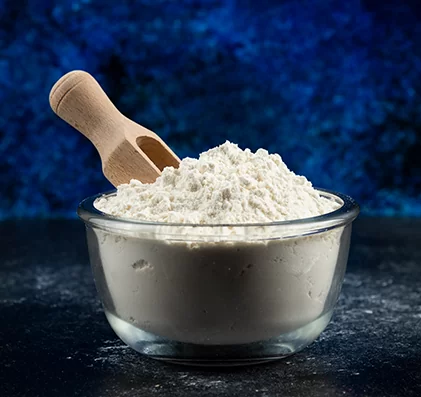
Xanthan Gum
Xanthan gum’s main use case is as a stabilizer and thickener in order to improve food products. It can be added to liquids in order to create a more gel-like consistency, which is then added to foods to improve their texture. Products that often incorporate xanthan gum include sauces, salad dressing, gluten free baked goods, and dairy substitutions.
The FDA, US Food and Drug Administration, as well as the EFSA, the European Food Safety Authority, have classified xanthan gum in the category of generally recognized as safe, often abbreviated in the acronym GRAS.
While this is true, and usually xantham gum is well tolerated by most individuals, some people may have unwanted digestive effects if they consume it. That can translate to uncomfortable symptoms like bloating, gas, and loose stools. While they’re often mild symptoms, they can still be quite a nuisance, especially for people who are very sensitive to digestive issues.

It Is Used As A Thickening Agent and Stabilizer
Of course, we should also be aware of the fact that while uncommon, allergies to xanthan gum also exist, so it is important to keep that in mind and consult with proper healthcare professionals before consuming xanthan gum, especially if you have a history of allergies to similar products.
While xanthan gum is listed as a food additive that is GRAS, it is a good idea to remember that all food additives should be consumed in moderation. While it may not be a huge issue if consumed in small quantities, you should remember that many food products containan plethora of food additives, so these can quickly add up. Long-term effects of all of these food additives in conjunction with growing sedentary lifestyle are yet to be discovered.
While xantham gum is a useful additive for manipulating a food’s texture and viscosity, it is a good idea to keep in mind that it does come with some potentially worrying impacts on health. It’s best to keep the consumption moderate, and individuals with particular sensitivities should be extra careful as well. Reading food labels can help you make decisions about what you are consuming and better tailor your choices according to your health requirements and preferences.

It Should Be Consumed In Moderation








